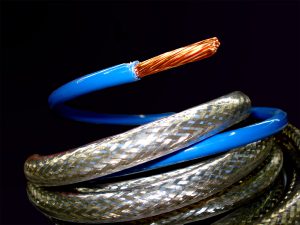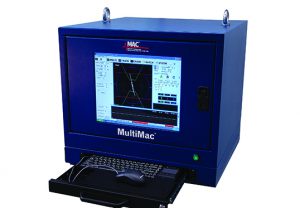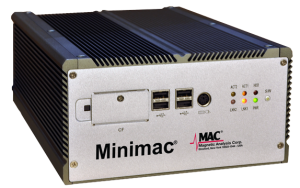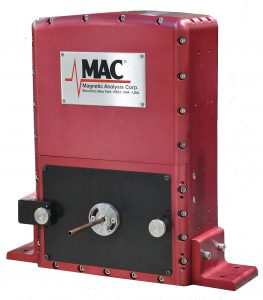WIRE AND ROD
Eddy Current technology is the go-to wire and cable testing method for checking continuity, alloy, flaws and other conditions as well as for locating welds and splices.
MAC® instruments can handle a range of metal wire including cut lengths, continuous production, stranded, multi-conductor and insulated cable. Carbon steels, stainless alloys, copper, aluminum, titanium and other nonferrous metals can also be inspected.
Typical flaws and conditions include chevron cracks, laps, seams, slivers, weld line faults, welds, butt welds, breaks, continuity checking, variations in heat treat, grade, alloy, and other flaws and conditions.

Markers, controls, demagnetizers and components for mounting encircling or segment test coils and saturation coils (for testing magnetic material) and positioning and driving the material through the test are combined with MAC instrumentation to make up a complete system
The bottom line: the choice of equipment depends on the nonconforming conditions you wish to detect and the size and characteristics of the material.
Some typical applications include:
- Testing Cold Drawn Wire
The Eddy Current test can be installed on a processing machine such as a bull block or cold header. Encircling test coils, including DC saturation on magnetic steel wire, are used to detect short defects. Rotating probes are used to find longitudinal defects. - Testing Insulated Wire & Cable
Multimac® can handle high throughput speed testing of multi-conductor automotive and building wire to detect splices, welds and breaks. Split coils are available to accommodate oversize splices. - Detecting Defects in Small Diameter Wire
Test frequencies ranging up to 5 MHz are most effective on small diameters as small as 0.0035”. The Rotomac® 20mm HS high speed Eddy Current rotary is designed to detect longitudinal defects such as seams and laps in wire ranging from 2 to 20mm diameter, and operates at speeds up to 18,000 RPM for high production output. - Short and Long Continuous Surface and Subsurface Defects
For applications that require the detection of both short and long, seam type defects, the MultiMac®, used with encircling coils and a rotary probe type tester, allows simultaneous detection of both types of defects in magnetic or non-magnetic material. Cold Header and Similar Slow Throughput Operations
Packaged with our Minimac® 60/65 single channel eddy current electronics, the Rotomac®25 RM Rotary provides cost-effective, reliable on-line inspection for longitudinal surface defects in wire, rod and heavy wall tube, 3 to 25mm diameter. Equipped with a standard single phase AC power input, new air ride probe arm design and bushings, it is designed for use in cold heading, spring making, strut rod, and other slow throughput operations.- Continuity Checking in Wire
To check for continuity in single or multi-conductor insulated wire and cable, the Minimac® 50/55 requires minimal operator time and can be installed directly on the production line. Split or segment coils can be used to allow for dimensional changes in the outside diameter of the insulation. - Alloy, Heat Treat & Hardness Detection
Variations in alloy, heat treatment, case depth and hardness can be detected by MAC’s comparator instruments such as the Varimac® eddy current tester and the Production Comparator low-frequency electromagnetic unit. The Varimac can test a range of product shapes and materials including nonmagnetic stainless steels, while variations in carbon steel wire are best detected by the Production Comparator.
MULTIMAC®
Eddy Current Instrument for Testing Tube, Bar, & Wire

- Operates with encircling, sector, or rotary test sensors.
- Up to eight test channels, null or absolute, can be used in any combination.
- Detect short surface and some subsurface defects in tube, bar, and wire.
- Inspect welded tube for short ID or OD defects in the weld zone.
MINIMAC® 50 and 55
Economic, Single-Channel Eddy Current (ECT) Testers For Simple Inspection of Continuous Product

- Affordable, compact ECT testers offer high performance at a low cost.
- Both designs operate at speeds over 4000 f.p.m., take up less space, and do not require cooling.
- Detect short surface and some subsurface defects in tube, bar, wire and rod.
- Designed with software controls for all functions including phasing, filtering and sensitivity.
- Full-color polar and linear monitor displays of real time, true wave form signals.
- Enable on-site or remote location review.
EDDY CURRENT TECHNOLOGY
MAC’s® Eddy Current Testing (ECT) systems incorporate computer-based test instruments and test coils that use two ECT coil technologies: encircling and sector coils, and spinning or rotary probe coils.
- Encircling and sector Eddy Current coil tests perform in this manner:
- The product is passed through or adjacent to an electrical test coil, which has been excited by an alternating current.
- This induces a flow of eddy currents around the test material or in the case of a sector coil, in the area under the coil.
- Short, intermittent anomalies or flaws cause a variation in the eddy current pattern, which the instrument detects.

20mm High Speed Rotary

